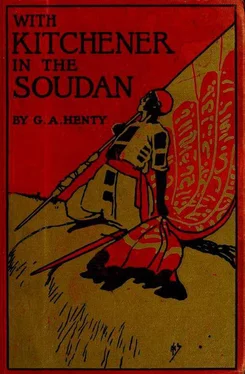"But I suppose he is really heir to it?"
" Yes, if no one else claims it. For aught that is known, there may be half a dozen children of the man that is missing, knocking about somewhere in Canada or Australia; if so, they are safe to turn up sooner or later. You see, as the man had an elder brother he would not have counted at all upon coming to the title. He may be in some out-of-the-way place where even a colonial newspaper would never reach him, but sooner or later he or some of his sons will be coming home and will hear of the last earl's death, and then this fellow's nose will be put out of joint. I am sure every one in the regiment would be glad, for he is an insufferable ass. I suppose, when he comes into the title he will either cut the army altogether or exchange into the Guards."
The party presently broke up, having finished the last bottle of wine they had brought up. Gregory remained seated by the Major, discussing the chances of the campaign and the points where resistance might be expected. The other officers stood talking a short distance off. Presently Gregory caught the words—
" How is it that this young fellow calls himself Bimbashi, which, I believe, means major?"
"He does not call himself that, although that is his rank. All the white officers in the Egyptian army have that rank, though they may only be lieutenants in ours."
"I call it a monstrous thing," the drawling voice then said, " that a young fellow like this, who seems to be an Egyptian by birth, should have a higher rank than men here who have served fifteen or twenty years."
The Major got up and walked across to the group.
"I will tell you why, Mr. Hartley," he said in a loud voice. "It is because, for the purpose of the war in this country, they know infinitely more than the officers of our army. They talk the languages, they know the men. These blacks will follow them anywhere to the death. As for Mr. Hilliard, he has performed feats that any officer in the army, whatever his rank, would be proud to have done. He Avent in disguise into the Dervish camp at Metemnieh, before Hunter's advance began, and obtained invaluable information. He jumped overboard from a gun-boat to save a drowning Dervish woman, although to do so involved almost certain capture and death at the hands of the Dervishes. In point of fact his escape was a remarkable one, for he was tied to a tree in the first line of the Dervish defences at Atbara, and was only saved by what was almost a miracle. He may not be heir to an earldom, Mr. Hartley, but he would do more credit to the title than many I could name. I hear him well spoken of by everyone as an indefatigable worker, and as having performed the most valuable services. Captain Keppel, on whose gun-boat he served for two or three months, spoke to me of him in the highest terms, and General Hunter has done the same. I fancy, sir, that it will be some years before you are likely to distinguish yourself so highly. His father was an officer who fell in battle, and if he happened to be born in Egypt, as you sneeringly said just now, all I can say is that, in my opinion, had you been born in Egypt you would not occupy the position which he now does."
Gregory had walked away when the Major rose, and he did not return to the party. It was the first time that he had run across a bad specimen of the British officer, and his words had stung him. But, as he said to himself, he need not mind them, as the fellow's own comrades regarded him, as one of them said, as " an insufferable ass ". Still, he could not help wishing to himself that the missing heir might turn up in time to disappoint him.
General Hunter started next day at noon with two of his brigades and the mounted troops, the other two brigades following at nightfall. The previous night had been one of the most unpleasant Gregory had ever spent. The long-expected rain had come at last. It began suddenly; there was a flash of lightning, and then came a violent burst of wind which tore down the tents and the flimsy shelters of the Egyptians and Soudanese. Before this had ceased, the rain poured down in a torrent; lightning, wind, and rain kept on till morning, and when the start was made everyone was soaked to the skin. The Egyptian baggage left at the same time in native craft.
That evening they arrived at the mouth of the Shabluka Cataract. Here it had been expected that the advance would be opposed, as strong forts had been erected by the enemy, the river narrowed greatly, and precipitous rocks rose on either side. Through these the course was winding and the current ran with great strength, the eddies and sharp bends making it extremely difficult for the gun-boats to keep their course; indeed it would have been impossible for them to get up had the forts been manned, as they would have had to pass within two hundred yards of the guns. But although the forts could hardly have been attacked by the gun-boats, they were commanded by a lofty hill behind them, and the scouts had discovered some weeks before that the Dervishes had retired from the position and that the passage would be unopposed. Maxwell's and Collinson's brigades started at four that afternoon, and the next day the whole division was established at El Hejir above the cataracts.
Lyttleton's brigade started at five o'clock A.M. on the 25th, the gun-boats and other steamers moving parallel with them along the river. At five in the afternoon the first brigade followed, and two days afterwards the camp was entirely evacuated and the whole of the stores well on their way towards El Hejir. On the previous day two regiments of Wortley's column of friendly natives also marched south.
The Sirdar and head-quarters, after having seen everything off, went up in a gun-boat, starting at nine in the morning.
As usual the Soudanese troops had been accompanied by a considerable number of their wives, who were heavily laden with their little household goods, and in many cases babies. They trudged patiently along in the rear of the columns and formed an encampment of their own half a mile away from the men's, generally selecting a piece of ground surrounded by thick bush, into which they could escape should Dervish raiders come down upon them.
The stores arrived in due course. One of the gun-boats, however, was missing—the Zccfir, with three gyasses in tow, having suddenly sunk ten miles north of Shendy owing to being so deeply loaded that the water got into the hold. Those on board had just time to scramble into the boats or swim to shore. No lives were lost, though there were many narrow escapes. Among these were Commander Keppel and Prince Christian Victor, who were on board. Fortunately, another steamer soon came along and took the gyasses, with the shipwrecked officers and crew on board, and towed them up to El Hejir.
It had been intended to stay here some little time, but the Nile continued to rise to an altogether exceptional height, and part of the camp was flooded. At five o'clock, therefore, the Egyptian brigades started, with the guns on their right and the steamers covering their left, while the cavalry and camel corps were spread widely out in advance to give notice of any approaching Dervish force. As usual the soldiers' wives turned out, and as the battalions marched past, shouted encouragement to their husbands, calling upon them to behave like men and not to turn back in battle. The presence of the women had an excellent effect on the soldiers, and in addition to their assistance in carrying their effects, they cooked their rations, and looked after them generally. The Sirdar, therefore, did not discourage their presence in the field, and even supplied them with rations when it was impossible for them to obtain them elsewhere. In the afternoon the two white brigades also moved forward. At nine o'clock they arrived at their camping-ground, and the whole army was again collected together.
Читать дальше












